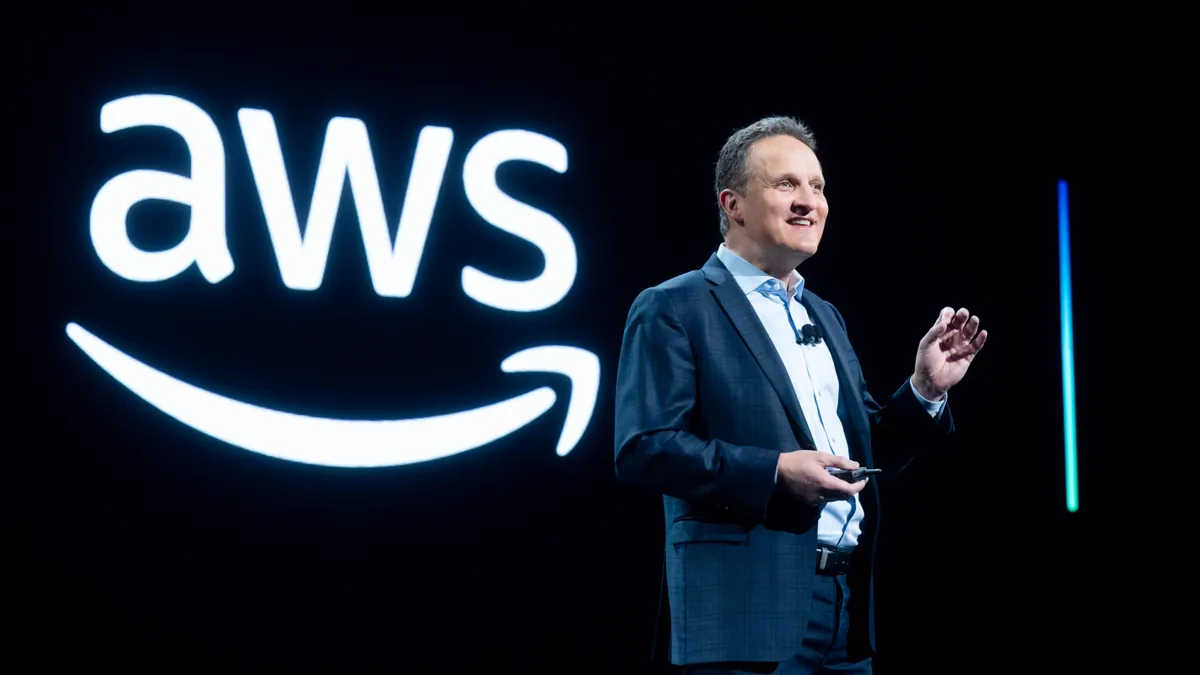Dive Brief:
- Amazon logistics head John Felton will move to take on the top financial seat for the e-commerce company’s Amazon Web Services division, according to a Thursday blog post by Doug Herrington, CEO of worldwide Amazon stores.
- A long-time veteran of the e-commerce giant, Felton will move to take the role of senior vice president and CFO of AWS after serving a 12-year span with Amazon’s operations team, Herrington said. Another Amazon executive, Udit Madan, will move into Felton’s role as SVP of worldwide operations, according to the Thursday post.
- Felton is taking AWS’s financial reins as the division — which offers enterprise cloud-based products such as storage, databases and analytics to businesses — has seen slower growth in the past few years, with companies reducing spending in the face of economic uncertainty.
Dive Insight:
Felton will replace current AWS CFO Richard Puccio, who plans to leave the company, according to a report by The Wall Street Journal which cited people familiar with the matter. Amazon did not respond to questions about when the leadership changes would be effective, declining to comment further beyond the details included in its blog post.
A member of the company’s senior leadership or “S-team,” Felton first joined Amazon in August 2004 as a senior financial analyst, US media vendor management, according to his LinkedIn profile. He’s held various roles throughout his near two-decade career at the company, including serving as director, finance for video games and electronics retail finance and director, investor relations, and took on the SVP of worldwide operations position in July 2022.
He is leaving the operations network “in a strong place,” Herrington said in the company’s blog post, noting that most recently, Felton and the operations team has “led the successful work to regionalize our U.S. network, both improving our delivery speeds for customers and reducing our cost to serve.”
The move is a “bittersweet” one, Felton said in an email to Amazon employees referenced in the blog post and praising the team’s accomplishments over the past year.
“We lowered our cost to serve for the first time in years, while driving our fastest delivery speeds ever for Prime customers,” Felton wrote. “At the same time, our recordable injury rate improved even more year over year, and it’s down double-digits since 2019. I’m incredibly proud of these accomplishments.”
The decline in the company’s recordable injury rate comes as the e-commerce behemoth has struggled with labor challenges, including layoffs and reports of unsafe working practices. Though declining, Amazon’s injury and illness rates were higher than average when compared to other warehousing companies in 2022, according to an April 2023 report by Bloomberg Law.
The company has also conducted repeated rounds of layoffs since late 2022, most recently laying off 30 employees in its Buy With Prime division which enables companies to offer Amazon’s payment services on their websites, according to a CNBC report.
As well as labor shakeups, Amazon has also been experiencing slowing growth in its AWS division in the face of economic headwinds. AWS segment sales grew 12% year-over-year to $23.1 billion in the company’s most recent quarter ended Sept. 30, according to the company’s quarterly results. The 12% bump matched its Q2 growth rate for the segment, but was below the 16% year-over-year increase it reported for the first quarter of 2023 and the 20% growth in the segment it reported for its fourth quarter of 2022.
Despite its lukewarm quarterly results, Amazon executives expressed optimism about AWS’ future growth during its Q3 earnings call in October, citing investments in new technologies like generative AI that could potentially boost future revenue and adoption.
On the call, Amazon CEO Andy Jassy pointed to several large-scale partnerships between AWS and companies looking to build or train GenAI or large language models — in September, the company inked a partnership with LLM startup Anthropic, with Amazon poised to invest as much as $4 billion into the startup to help it compete in an AI-supported cloud market, according to a report by Reuters. As part of the deal, Anthropic committed to AWS as its primary cloud provider, Jassy said.
“It's also worth remembering that customers want to bring the models to their data, not the other way around,” Jassy said of AWS’s generative AI work. “And much of that data resides in AWS as the clear market segment leader in cloud infrastructure. We're innovating and delivering at a rapid rate and our approach is resonating with customers.”
Amazon is slated to report its Q4 results on Feb. 1.












